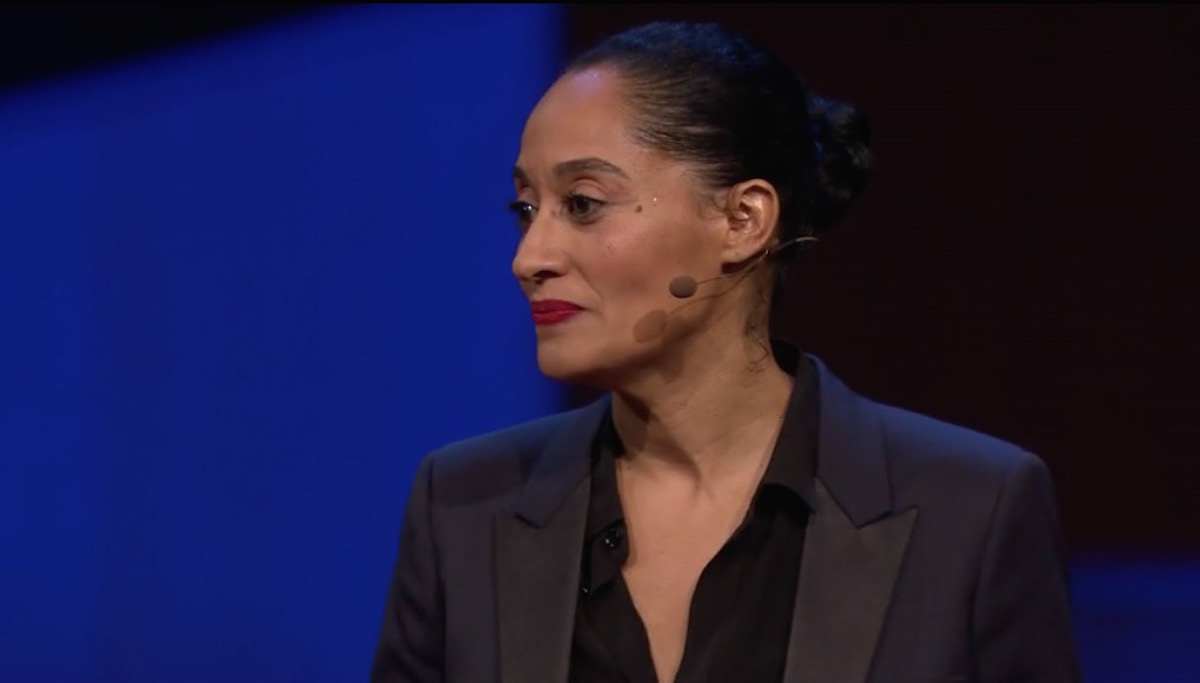Tracee Ellis Ross Opened the Annual TED Conference With a Must-Watch Speech on Owning Women’s Fury

Earlier this month, Tracee Ellis Ross opened the annual TED Conference with a speech about the fury women are feeling, and have always felt, and how it’s not something to bury or run from. Rather, we need to listen to that fury and all the wisdom it holds. The video of Ellis’ speech has now been released and I want you to know that I am not exaggerating, not even a little bit, when I say that you need to be watching this video right now.
Ross begins with a story about a friend of hers who, while filling out forms at the post office, suddenly found a man’s hands on her, physically moving her out of his way so he could reach something she was blocking. From the sound of it, he didn’t even shove her. It wasn’t violent. It was two hands on her shoulders, picking her up and moving her, like an ottoman, “like a salt shaker,” like an inconsequential, inanimate object that barely even registers as existing, except in so much as it was casually in his way.
Ross’ friend was shocked at first, of course. “And then a fury rose up in her that she could not explain,” Ross says. “Not annoyance. Not frustration. But ‘fury’ was the word that she used.” And she didn’t know why. The man didn’t hit her or be violent with her. “He moved me. And I wanted to hurt him.”
And Ross says that just in hearing about the story, she felt fury, too. As did I. I’m guessing a lot of you reading or hearing the story felt it. Not irritation, but real fury. As Ross says, “this is a word and a feeling I was hearing a lot about lately.”
“This fury was not my friend’s alone,” Ross says. “Her fury was ignited by lifetimes of men helping themselves to women’s bodies without consent. There’s a culture of men helping themselves to women.” Sometimes it’s seemingly innocuous, like in her friend’s case. Sometimes it’s an unthinkable sexual violation. Sometimes it’s limited to men’s words, letting us know that they believe they have authority over us.
We hear far too often that women don’t know the difference between these things. We hear Matt Damon, standing in for so many others who share his views and his underestimation of women, telling us that there need to be different reactions to men like Harvey Weinstein than there are to Aziz Ansari, as if we don’t know that. They don’t see how these acts on totally different ends of the spectrum can be thought of in the same space.
I’ve never heard it put more eloquently than Ross’ explanation:
The common thread is the spectrum. The commonplace makes space for the horrific. And women have to live with the effects of both and everything in between.
Women encounter everything from microaggressions to aggression-aggressions every day. Often multiple times a day. And we’ve never, collectively, had a socially acceptable outlet for the rage that instills in us. (Ross notes, “And if you add in the history of race–which is a whole other talk–it gets exponentially more complicated.)
For all the men wondering why women are suddenly so angry, or why so many men are suddenly being called out for their bad behavior, there’s nothing sudden about any of it. This has been living inside of us for far too long.
That fury that my friends felt holds centuries of never being able to directly address or express our indignation, our frustration, and our rage. When someone thinks they can help themselves to our bodies, it not only ignites the current fury, but it lights up the past.
What seems like a benign moment at the post office is actually an anger grenade.
Well … kaboom.
I encourage you to watch the video in full. And as a follow-up, read this powerful account from musician Toni Hartley (who goes by The Birdhorse professionally). She attended the talk and describes an encounter that happened after Ross spoke.
She writes that after the talk, “a handful of TED attendees stood up to ‘respectfully respond’ to various talks and a white man stood up to respond to Tracee’s. He spoke about how she came with too much rage, too much fury, that she did nothing to invite him in, and then mentioned his habit of being a good feminist dad by correcting folks who tell his daughters they are beautiful by pointing out to them that they are also smart.
I know Ross was talking about big emotions, but I don’t know how anyone could hear her measured voice and feel the need to tune out. Hartley says she spoke with the man for at least 20 minutes, asking him why he rejected the speech and also “unfortunately, but very likely, have to one day hold the rage of his daughters. And they will need to also learn how to show up for black women and hold their rage.”
Hartley asks,
Why did he check out from her talk? Why was her passion and calling out of violent patriarchy so threatening to him? He rejected Tracee’s call to action because of his white, male inexperience in sitting with discomfort. It is our job to sit in the discomfort of hearing voices from the margins. It’s our job to let them be heard. Rage and all.
(via Tracee Ellis Ross on Twitter, image: screencap)
Want more stories like this? Become a subscriber and support the site!
—The Mary Sue has a strict comment policy that forbids, but is not limited to, personal insults toward anyone, hate speech, and trolling.—
Have a tip we should know? [email protected]
